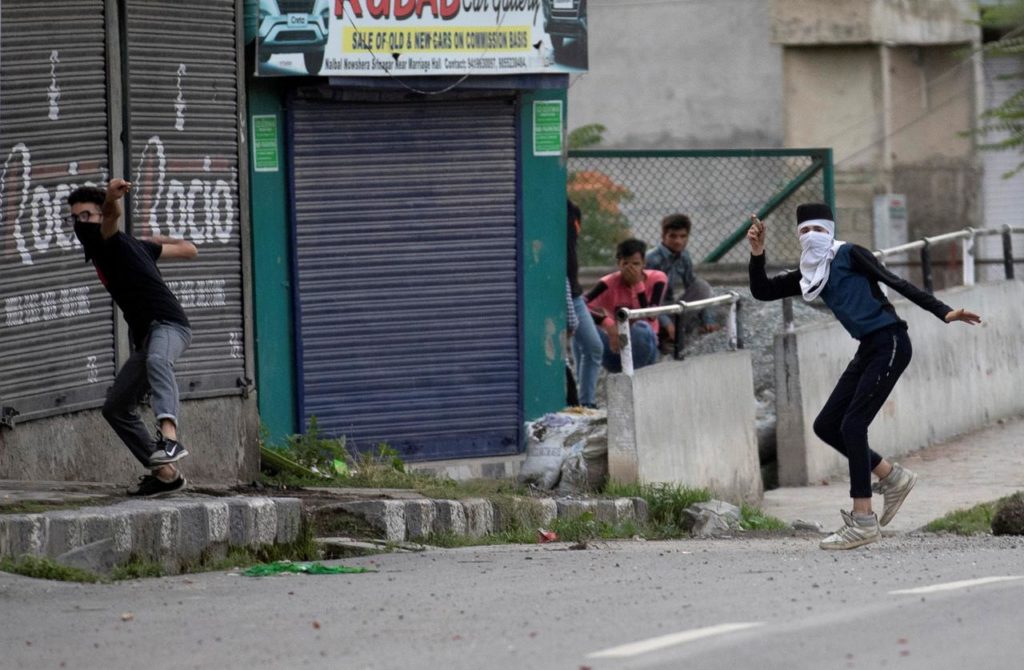Some Signs Of Normality Return To Kashmir, But India’s Clampdown Still Strict
Aug 11, 2019 | Pratirodh Bureau
Kashmiri residents throw stones towards Indian security forces during restrictions after the scrapping of the special constitutional status for Kashmir by the government, in Srinagar
For the first time in six days, India eased travel restrictions in some parts of Srinagar on Saturday, and people flooded the streets of Kashmir’s summer capital to buy provisions ahead of the Muslim festival of Eid-al-Adha on Monday.
But with public mobile, landline telephone and internet connections still severed by the authorities in most of the Indian-administered Jammu and Kashmir state, many people were still struggling to make contact with relatives to plan the holiday.
And some homeowners and city workers were left to clean up Srinagar’s streets on Saturday, a day after police used tear gas and fired pellets to control a protest after Friday prayers over India’s withdrawal of special rights for the Muslim-majority state.
Seeking to tighten its grip on the region also claimed by neighbouring Pakistan, New Delhi on Monday scrapped the state’s right to frame its own laws and allowed non-residents to buy property there.
Prime Minister Narendra Modi’s government also locked down the revolt-torn region, cutting off communications, detaining more than 500 political leaders and activists, and putting a ‘virtual curfew’ into force with numerous police and army roadblocks stopping movement by many residents.
Regional leaders had warned of a backlash in the region, where militants have been fighting Indian rule for nearly 30 years, leading to the deaths of more than 50,000 people.
PROTEST GRAFFITI
Signs of Friday’s protest – the largest since India’s clampdown – were visible in the Soura area of Srinagar on Saturday.
Large rocks, wooden platforms, poles and boulders blocked the main street, and shops were shut. Protest graffiti, including calls for “Azadi” – the Urdu word for freedom – were visible.
Reuters reported at least 10,000 people were involved in Friday’s protest, based on an estimate provided by a police source and backed up by two eyewitnesses. Another official source on Saturday gave Reuters the same estimate.
In a tweeted statement on Saturday, the spokeswoman for India’s Ministry of Home Affairs, Vasudha Gupta, said that the estimate of 10,000 was “completely fabricated & incorrect”.
There had been a few “stray protests” in the area but “none involved a crowd of more than 20 ppl”, she said.
Reuters was unable to reach Gupta for further comment.
Video footage carried by international news channels, the BBC and Al Jazeera and available online, appeared to show very large crowds protesting in Srinagar on Friday.
In the Bemina area of western Srinagar, around a dozen residents told Reuters that security forces had thrown stones and bricks at homes and cars in retaliation for the protests, breaking windows as a result.
The Indian government did not immediately respond to a request for comment about the alleged incident. Reuters was not able to independently verify the residents’ claims.
“Why is India doing this to us?” said an elderly man, Mohammed Sultan, whose truck that he used to transport goods and earn a daily wage was damaged. Pointing to his two young grandsons, he said: “How do I do my work and feed these people now?”
Another woman screamed: “Is this how Modi is going to bring development to us?”
QUEUEING FOR HOURS
Many people sought out the few policemen who have been provided with mobile phones. At a crossroads in Srinagar’s Nowhatta area, a police official said around 78 people had used his phone on Saturday to contact relatives outside Kashmir.
Inside a second-floor meeting room at Srinagar’s district administration office, more than 100 people crowded around two mobile phones to make calls outside the valley.
An official there, who declined to be named, said 354 people had registered their names to use the phones.
“My serial number is 309, I do not know when I will be able to talk to them,” she said.
COMMUNICATIONS BLACKOUT CRITICIZED
Modi’s Hindu nationalist Bharatiya Janata Party and even some top opposition leaders have welcomed the decision to absorb Kashmir fully into India, and it has brought him support across the country.
The BJP has long campaigned for abrogating Kashmir’s special privileges in the constitution, which it sees as an appeasement to Muslims and a hindrance to its own development.
International rights groups, including Amnesty International, have urged the Indian government to end the communications blackout.
The Editors Guild of India on Saturday issued a statement saying it was impossible for journalists to cover developments in Kashmir without internet access. “Media transparency has and always should be India’s strength, not fear,” it said.
Congress member of Parliament Rahul Gandhi on Saturday called on the government to respond to reports of violence in Kashmir and provide more information about the situation on the ground.
Arch-rival Pakistan, which lays claims to Kashmir, has downgraded diplomatic ties with India and suspended trade in anger at its latest move. Pakistan said on Saturday it had cancelled a bus linking Lahore with Delhi, the last remaining public transport link between the neighbours.
Russia on Saturday said the administrative changes in the region were carried out within India’s constitutional framework, according to Reuters partner ANI.
But Pakistan said on Saturday that it has gained China’s support to take a motion to the United Nations Security Council condemning the Indian decision to change the status of Jammu and Kashmir.
